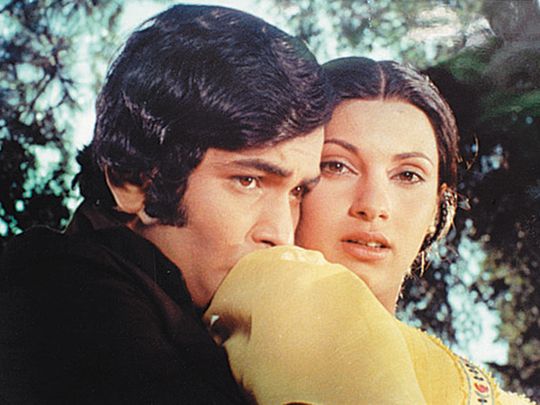
It was in those Friday afternoons, more than four decades ago, as children that we got introduced to Indian films. In those days, most Gulf television stations would show the Hindi hits every Friday afternoon, from 3 to 6pm. And we were glued to the TV sets, watching the mostly romantic stories told amid colourful songs and dance.
Bobby was among those hits that we watched in awe on one of those memorable Fridays. It was Rishi Kapoor’s first starring role, I learned years later. The rich-Hindu boy-meets-poor-Christian girl story was a talking point the next day at school. Decades later, I still remember some of the scenes of that film, especially the dramatic ending when Raj and Bobby were rescued by their fathers after the lovebirds jumped in the water.
Like most of Bollywood’s movies in those golden years, the romantic era, the film was overly melodramatic, decorated with the uniquely Bollywood dance and songs, mostly by the legendary playback singer Lata Mangeshkar. But it was Rishi Kapoor that made the difference to that picture. The rebel who refused to go along with his rich dad’s outdated traditions. The handsome angry young man who made a usually doomed relationship look not only appropriate but so enviable. The film went on to become one of Bollywood’s top box office grossing films.
I have always remembered fondly those early Indian blockbusters, such as Zanjeer and Deeewar. But Bobby will forever have a special place in my heart and the hearts of millions of Bollywood’s fans.
On Wednesday, Rishi Kapoor passed away at 67. He was suffering from leukaemia. The news of his death came a day after the death of another Bollywood A-lister, Irrfan Khan. But Kapoor’s death touched me, like millions of others I am sure, personally. It took me back more than 30 years, bringing all those memories of the family Friday afternoons. He was part of my growing up.
I remember those afternoon gatherings on tea and bowls of nuts and biscuits as we sat in front of the TV and my mother with her teary eyes shouting at us to keep quiet. Outside, meanwhile, the neighbourhood teenagers, some with Bobby’s Raj hairstyle, desperately seeking their own love story.
My generation grew up when the local television was perhaps the only entertainment people have. It wasn’t a 24-hour broadcast like nowadays. The broadcast would start at 9.30am in the summer and sign off around 1.30pm, to resume only at 6 in the evening. Following the nightly news and the evening film, the TV station would sign off again around midnight. However, on Fridays, there is no afternoon intermission. Because it is a holiday, the TV broadcast would continue from the morning until it signs off at midnight. The Friday afternoons of course were almost fully booked for the Hindi film.
The Gulf people’s fascination with Indian movies has so many roots but comes mainly in line with our historic relationship with India. This relationship goes back hundreds of years through trade, Islamic conquests and reciprocal migration. In the first part of the 20th century, it was almost about trade. Nevertheless, there were thousands of Gulf citizens who travelled to India to study in its prestigious schools and universities during the first half of the last century. Later on, when Gulf countries began their development phase as nation states following the start of oil exports, in the second half of the century, Indians were one of the first communities to come here to take part in the amazing development of the Gulf states.
Today, Indians represents the largest migrant community in most Gulf states. Their impact is not just in the trade, business, constructions or the service sectors, there is a considerable cultural influence on the region — from the cuisine to the arts. And movies were a big part of that influence. Thus, Rishi Kapoor and his family of legendary actors, like his father Raj Kapoor and grandfather Prithviraj, who are considered the architects of Indian cinema, can very well be called pioneers of that cultural influence.
That impact could very well be lost in today’s India — an immensely polarised society, where hate and violence have crept into this multicultural nation of 1.4 billion people. The earlier films that united millions of people in joy, laughter and tears for decades would probably go unnoticed today with all the political and religious rhetoric. And most probably, there would not be a place to produce such extraordinarily heartwarming films like Kapoor’s. His legacy will however remain alive with those who still believe in the Indian mosaic.
With his departure, we are left with nostalgia. Rishi Kapoor represented the gentleman hero in countless films of the romantic era, well before the new special-effects, computer-made pictures came to dominate Indian theatres. With the coronavirus quarantine, it has been a chance for me to go back and watch some of those gems. It is sort of nostalgic probably. But it’s worth every minute.
I have always remembered fondly those early Indian blockbusters, such as Zanjeer and Deewar. But Bobby will forever have a special place in my heart and the hearts of millions of Bollywood’s fans. As India, and the film world, mourn Rishi Kapoor, I would like to thank him for all those wonderful memories.







